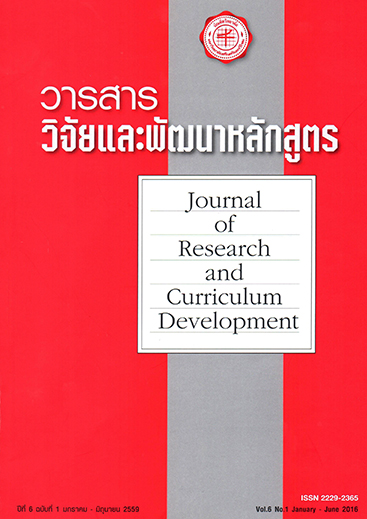การพัฒนาแบบวัดกลวิธีการกำกับตนเองในการเรียนรู้คณิตศาสตร์ของนักเรียนชั้นมัธยมศึกษาปีที่ 3
Keywords:
กลวิธีการกำกับตนเองในการเรียนรู้, คณิตศาสตร์, โมเดลสมการโครงสร้าง, self-regulated learning strategies, mathematics, exploratory structural equationmodelAbstract
การวิจัยครั้งนี้มีวัตถุประสงค์เพื่อพัฒนาแบบวัดกลวิธีการกำกับตนเองในการเรียนรู้คณิตศาสตร์ของนักเรียนชั้นมัธยมศึกษาปีที่ 3 โดยพัฒนาข้อคำถามจากการศึกษาแนวคิดทฤษฎีและงานวิจัยที่เกี่ยวข้อง จำนวน 30 ข้อ ตรวจสอบความเที่ยงตรงเชิงเนื้อหาโดยยผู้เชี่ยวชาญ จำนวน 5 คน มีค่าระหว่าง 0.6-1.0 นำไปทดลองใช้กับนักเรียนชั้นมัธยมศึกษาปีที่ 3 จำนวน 50 คน เพื่อหาความเชื่อมั่นของแบบวัด มีค่าเท่ากับ 0.636 จากนั้นนำไปใช้กัลกลุ่มตัวอย่าง จำนวน 468 คน ผลการวิจัย พบว่า แบบวัดกลวิธีการกำกับตนเองในการเรียนรู้คณิตศาสตร์ของนักเรียนชั้นมัธยมศึกษาปีที่ 3 มีทั้งหมด 24 ข้อ มีค่าความเชื่อมั่นเท่ากับ 0.928 ข้อคำถามทุกข้อมีความสัมพันธ์กับคะแนนรวมทางบวก (item-total correlation) ตั้งแต่ 0.343-0.677 และมีนัยสำคัญทางสถิติ การวิเคราะห์ข้อมูลใช้การวิเคราะห์โมเดลสมการโครงสร้างเชิงสำรวจ (exploratory structural equation model : ESEM) พบว่า โมเดลการวัดมี 4 องค์ประกอบ สอดคล้องกลมกลืนกับข้อมูลเชิงประจักษ์ (X2 = 472.211, df = 186, CFI = 0.936, TLI = 0.906, RMSEA = 0.057, SRMR = 0.032) สรุปผลการวิจัยได้ว่า แบบวัดพัฒนาขึ้นมีความเหมาะสมและมีคุณภาพเชื่อถือได้
The Development of Mathematical Self-regulated Learning Strategies Scale Among MathayomSuksa 3 Students
This research aimed to develop mathematical self-regulated learning strategiesscale among mathayomsuksa 3 students. The method was reviewing related literatureand initiate items from them. The items were sent to 5 experts to investigate the contentvalidity ranged from 0.6 to 1.0, then, the scale was tryout with 50 mathayomsuksa 3students to determine the reliability of the measurements is equal to .636 Later, appliedthe scale to a sample of 468 mathayomsuksa 3 students. The result showed that 24 itemshad the strong reliability = 0.928, all questions correlated with the total score to positive(item-total correlation) from 0.343 to 0.677 and a statistically significant. Data wereanalyzed using Exploratory Structural Equation Model (ESEM) indicated the modelmetrics has four elements and fitted consistent with the empirical data (x2 = 472.211, df = 186, CFI = 0.936, TLI = 0.906, RMSEA = 0.057, SRMR = 0.032). Conclusions thatthe scale developed are appropriate and reliable quality.


